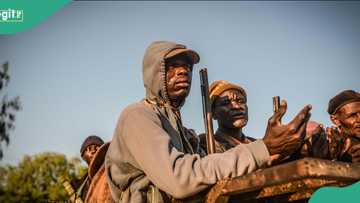Over 90% of Deadly Bandits in Katsina Are Known Locals with Traceable Roots, Claims Radda
- Governor Dikko Radda has stated that the majority of bandits operating in Katsina State are not outsiders but locals
- He explained that over 90 percent of them are known individuals, with ties to the region and even identifiable family roots
- To combat the crisis, his administration has formed a local security outfit made up of youths from affected areas to support intelligence and on-ground operations
Governor Dikko Umaru Radda of Katsina State has revealed that the overwhelming majority of individuals involved in the state’s persistent banditry crisis are not foreigners but locals familiar with the terrain and communities they attack.

Source: Facebook
Katsina governor says bandits are locals
Speaking on Channels Television on Tuesday, Radda said:
“Most of the perpetrators of banditry are from our own area. They are not aliens. Ninety-something percent of them, we know their fathers, their grandfathers, and they are living with us.”
He noted that these individuals, often deeply rooted within the local population, exploit their knowledge of the region and relationships within the community to perpetuate violence, making the fight against banditry more complex.
Katsina, like several states in the North-West region, has battled violent attacks by armed groups operating across forests and border areas.
These attacks have displaced thousands, claimed lives, and significantly stalled development efforts in the state.
“Insecurity is one of the major hindrances to meaningful development in our state,” the governor said as he lamented that despite being referred to as the chief security officer of the state, governors wield limited control over federal security agencies.
Local security outfit to aid federal agencies
To address the gap, the state government established a local security outfit composed of young people from areas most affected by bandit attacks.

Source: Facebook
The move, Radda explained, is aimed at leveraging local knowledge in tracking, identifying, and dismantling criminal networks.
“So this situation requires local involvement, and that was why we created this outfit, so that people at the local level can provide us with information,” he said.
“They can lead the fight to the enclaves of the bandits because they know the terrain better, and they can fish out informants living among us, giving information to the bandits and those that provide logistic support to the bandits.”
According to Radda, local participation is crucial for breaking the operational backbone of criminal elements, many of whom receive support from within their own communities.
Katsina Emir denied entry into event
In a related incident from earlier this year, tensions flared during a lavish wedding ceremony in Katsina when the royal guards of the Emir of Katsina forcibly broke a glass door after being temporarily barred from entering the venue.
The event, held in May at Governor Radda’s private residence, had President Bola Tinubu in attendance. The restriction, enforced by presidential security protocols, coincided with the Emir’s arrival, prompting his entourage to force entry.
Although the Emir was later ushered in without further disruption, the incident left guests visibly shaken and sparked discussions on power dynamics between traditional and political institutions in northern Nigeria.
Source: Legit.ng




